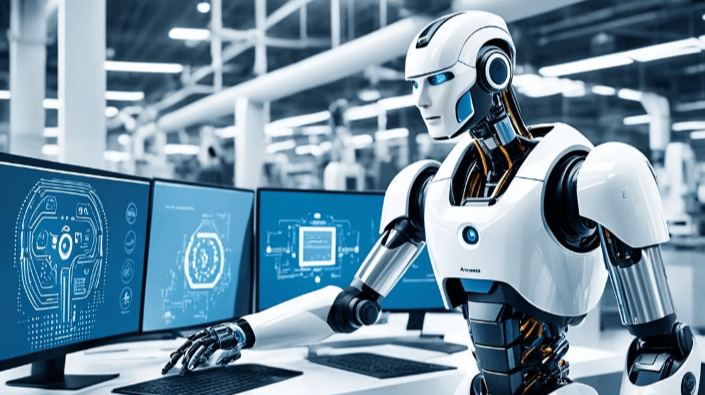The Future of Generative AI in Enterprises: Transforming Industries

Table of Contents
- Introduction to Generative AI
- Applications in Various Industries
- Challenges and Considerations
- Case Studies and Success Stories
- Future Trends and Predictions
- Implementation Strategies for Enterprises
- Ethical Considerations in Generative AI
- Conclusion
Introduction to Generative AI
Generative AI is revolutionizing the way businesses operate by offering advanced solutions for automating complex tasks. At its core, generative AI involves creating new data instances that resemble a given dataset, making it incredibly useful for various applications. Enterprises are increasingly adopting generative AI for enterprise solutions, recognizing its potential to enhance productivity and innovation.
Generative AI uses sophisticated algorithms and machine learning techniques to produce high-quality outputs with minimal human intervention. This new frontier in artificial intelligence empowers businesses to tackle challenges that were previously deemed too complex or time-consuming. Businesses can stimulate creativity, increase operational effectiveness, and obtain a competitive advantage in their particular industries by utilizing these skills.
Applications in Various Industries
In healthcare, generative AI enables the discovery of new drugs and personalized treatment plans by simulating biological processes and predicting patient outcomes. Pharmaceutical firms are speeding up their research and development (R&D) procedures, which results in quicker and more effective medication development cycles. This not only reduces costs but also brings life-saving medications to market more quickly, benefiting patients globally.
Finance is another sector that benefits greatly from generative AI. Financial institutions can safeguard their operations and reduce potential losses by creating models that can detect fraud with high accuracy. Additionally, AI-powered predictive analytics helps manage investment portfolios and assess market risks. Automated trading systems and customer service chatbots are other examples of how generative AI is making significant contributions.
Manufacturing industries also leverage these technologies to optimize supply chains and enhance product design. By using AI-generated simulations and prototypes, companies can reduce material costs and speed up the production process, resulting in increased efficiency and higher-quality end products. From automotive design to consumer electronics, generative AI transforms how products are conceived and brought to market.
Challenges and Considerations
While the benefits are clear, implementing generative AI comes with its own set of challenges. Data privacy concerns, the need for vast amounts of high-quality data, and the complexities of integrating AI into existing systems are all significant hurdles to overcome. Organizations must navigate these issues carefully to ensure successful AI adoption.
Moreover, there are technical challenges related to model accuracy and reliability. Generative AI systems must be meticulously trained and regularly updated to maintain their effectiveness. Ensuring that these systems can operate transparently and without bias is also crucial for maintaining trust and compliance with regulatory standards. To solve these problems, strong data governance policies, continual model monitoring, and collaboration across different organizational units are required.
Case Studies and Success Stories
Countless organizations have already seen the transformative power of generative AI. For example, a leading automotive company used AI to drastically reduce the time it takes to bring new vehicle designs to market by simulating numerous design options quickly. This not only sped up the design process but also allowed for more innovative and efficient vehicle designs, ultimately leading to improved customer satisfaction and increased market share.
The retail industry has also witnessed significant improvements, with companies using generative AI to personalize customer experiences and optimize inventory management. Through real-time data analysis and predictive modeling, retailers can provide more accurate demand forecasts and tailor their offerings to individual customer preferences. This improves the general shopping experience and fosters client loyalty, which promotes steady business growth.
Future Trends and Predictions
Generative AI is poised to continue its rapid growth and influence. According to a recent Forbes article, we can expect to see advances in AI’s capability to understand and generate human language, making it an even more powerful tool across industries. Enhanced natural language processing (NLP) and text generation will open new avenues in customer service, content creation, and data analysis.
As AI technologies become more accessible, even small and medium-sized enterprises can leverage these tools to gain a competitive edge. The democratization of AI will drive a wave of innovation and efficiency improvements across the business landscape. The combination of AI with other cutting-edge technologies, such as blockchain and the Internet of Things (IoT), will create new opportunities for growth and change.
Read also Real Estate Experts Share Tips for First-Time Homebuyers
Implementation Strategies for Enterprises
For businesses looking to integrate generative AI, a strategic approach is essential. This includes identifying specific use cases, building a skilled team, and investing in the right technology infrastructure. According to experts from BuiltIn, companies should also start with small projects to quickly demonstrate value before scaling up.
Collaboration between different departments is also vital for successful AI implementation. Businesses that foster an innovative culture and engage in continuous learning and assessment can ensure that their AI projects align with their broader company objectives and produce quantifiable results. Adopting an agile approach and maintaining flexibility in AI projects will also help organizations adapt to changing market conditions and technological advancements.
Ethical Considerations in Generative AI
With great power comes great responsibility. Ethical considerations such as bias in AI algorithms, transparency, and accountability are critical aspects that enterprises must address. Developing ethical guidelines and policies can help ensure the responsible use of generative AI. Organizations should prioritize fairness and inclusivity in their AI models to prevent unintended consequences and build trust with stakeholders.
In addition, ongoing auditing and surveillance of AI systems is required to identify and address any possible ethical issues. By involving diverse teams in developing and deploying AI technologies, enterprises can ensure that their AI solutions reflect a wide range of perspectives and minimize the risk of bias.
Read Also: How TELTLK Transforms Teaching and Learning
Conclusion
Generative AI holds immense potential to transform various industries by automating complex processes and generating innovative solutions. Businesses that strategically apply and responsibly manage AI technologies would stand to benefit the most as technology advances. Harnessing the full potential of generative AI will require remaining up-to-date and ready for emerging trends. By addressing challenges and leveraging the best practices, enterprises can unlock new opportunities and drive sustained growth in the era of AI.




